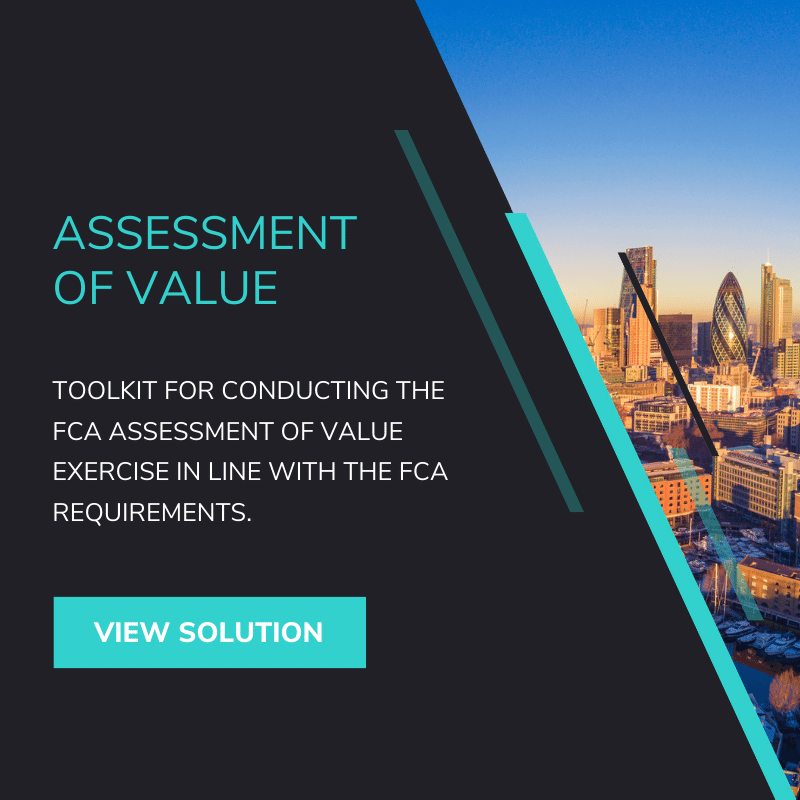The FCA’s terminology is “FCA Assessment of Value”, a shift from the earlier terminology of “Value for Money” which the FCA felt focused too much on the AFMs costs. Therefore, the focus from fund managers needs to be on the full value proposition for investors rather than focusing only on fund charges. Good value does not necessarily mean low cost!
WHAT DOES THE FCA ASSESSMENT OF VALUE REQUIRE?
The FCA sets out seven factors ( Assessment of Value 7 FCA Criteria ) that firms must consider when assessing the value for money of each shareclass. These are split between service and cost criteria:
- Quality of service
- Performance
- AFM costs – general
- Economies of scale
- Comparable market rates
- Comparable services
- Classes of units
Practically speaking however, all 7 criteria relate back to costs in one way or another.
Whilst there is no prescribed approach, the FCA has given examples of where firms are likely to be offering poor value for money, including closet-trackers and legacy pre-Retail Distribution Review (RDR) shareclasses. These and a number of other of points are considered in more detail below.
COSTS IN CONTEXT
How should AFMs review costs for their funds and shareclasses, and how granular is the analysis expected to be?
ALL COSTS NEED TO BE CONSIDERED
As a starting point, COLL 6.6.20 of the FCA Handbook makes clear that all payments out of scheme property must be justified in the context of the overall value delivered to unitholders.
The FCA has made clear that it expects firms to ensure good value for money not only in the annual management charge, but also in execution costs, research fees (if charged separately), and charges for other third party services such as custody, transfer agency and fund accounting. Regard needs to be had to the total cost of investing, including any adviser charges or platform charges.
NO MAXIMUM LIMIT ON COSTS
The FCA does not prescribe a maximum level of charges that it considers to be acceptable.
However, it is worth noting that elsewhere, the FCA has imposed a cap of 0.75% per year on default funds in auto-enrolled workplace pension schemes. That perhaps gives an indication of the level of charges that the FCA may consider reasonable for a type of fund that is likely to be relatively non-complex.
LEGACY RDR SHARECLASSES
The FCA is keen to see investors moved out of expensive legacy pre-RDR products in which only a small number of investors remain. The new rules, therefore, remove the need for an AFM to get consent from each investor before converting them to a cheaper but otherwise identical class of the same fund, and instead require 60 days’ notice to be given in advance of migration.
This will make it easier for firms to transfer investors out of legacy share classes and enable firms to close those legacy share classes
CLOSET TRACKERS
Attention also needs to be given to the degree of active management. An investor would not be receiving value if they were being charged fees for active portfolio management, where in fact, the fund’s composition or performance is staying very close to a benchmark.
Managers need to be wary of this. Across Europe, regulators and ESMA have shown themselves adept at spotting potential closet trackers, through large-scale data-driven oversight using measures such as R-squared, Active Share, Beta and Tracking Error.
For more on this see our recent article “Is your active fund really a Closet Tracker?“.
PERFORMANCE
As a starting point, it is difficult to argue how a fund with poor performance year-after-year can be considered a good value offering.
At COLL 6.6.21, the FCA make clear that performance needs to be considered after deduction of all payments out of scheme property.
However, the FCA has also acknowledged that performance should be considered, not just over the past year, but over an appropriate timescale having regard to the scheme’s investment objectives, policy and strategy.
Performance considerations also go hand in hand with other issues such as consideration of closet trackers, where the fees for active management should relate to the opportunities for out-performance versus the benchmark.
During the FCA market study they summarised results from studies of the US mutual funds industry which suggest that there is a negative relationship between the charges of a mutual fund and the performance of a fund manager. The analysis also included initial results from the UK retail active fund industry which suggested that there was no clear relationship between charges and the gross performance of retail active funds.
ECONOMIES OF SCALE
Consideration also needs to be given to the ability to achieve savings and benefits from economies of scale.
This seems an obvious point when considering the ability to benefit from economies of scale in custody, fund accounting, transaction costs, etc.
However, and maybe most controversially, the FCA seem to be pushing further on this and requiring consideration of the managers’ own fees.
When considering the ability to achieve savings and benefits from economies of scale regard also needs to be had to the “direct and indirect costs of managing the scheme property and taking into account the value of the scheme property and whether it has grown or contracted in size as a result of the sale and redemption of units.”
CLASSES OF UNITS
When making the FCA assessment of value, Managers need to be comparing the costs of the shareclass to the costs of other shareclasses of the same fund with substantially similar rights.
Again, this needs to consider the total cost of investing. This will involve consideration of the respective costs and the justification of differences based on key factors such as minimum deal sizes, initial, on-going charges, performance fees and exit charges as well as quality and service differences.
COMPARATIVE MARKET RATES
As well as conducting a review between different shareclasses of the particular funds, there also needs to be a comparison against comparable market rates.
Managers will need to make comparison against (i) the costs of comparable shareclasses of funds within their own fund range and (ii) comparable shareclasses of funds managed by other Managers.
Rather than comparing to the whole of the industry or even to other funds in the same sector, Managers will want to properly consider their own value proposition and determine their own comparative universe. This may have regard to a wide range of factors, including fund size, complexity, fund type, geographic coverage, distribution channels, existence of initial fees and performance fees, asset class, minimum subscription sizes, whether they are active or passive and also the investment style, e.g. direct investment vs fund of funds or synthetic investment.
COMPARABLE SERVICES AND QUALITY OF SERVICE
In making the FCA assessment of value assessment, regard should also be had to the range and quality of services provided to unitholders.
This assessment of quality of service is broad and allows for consideration of a wide range of factors that may be relevant to unitholders as regards their investment, to include for example, quality of reporting to unit holders, quantitative data around breaches, errors and complaints, value-added and bespoke services offered to specific shareclasses, quality of governance and systems and controls, among others.
Additionally, it is not confined to services provided directly to unitholders but may also include services undertaken on their behalf by the AFM, such as consideration of the quality of the investment process used to make decisions about managing the scheme property.
This is considered further in episode 7 of our AOV Series “AOV and Measuring Quality of Service.”
SUMMARY
Whilst the FCA has not been prescriptive in how Managers must perform the FCA Assessment of Value exercise, it is clearly a challenging and multi-faceted exercise, that needs to consider both quantitative and qualitative factors.
Given the breadth of factors that need to be considered, Managers need to consider their strategy for assimilating all of the relevant data so that they can consider FCA Assessment of Value in a complete and holistic manner.
This wide range of factors, coupled with the increasing availability of whole of market data, will create a situation where there is plenty of scope for challenge both from Regulators and other interested parties.
Request a Demo
Error: Contact form not found.













